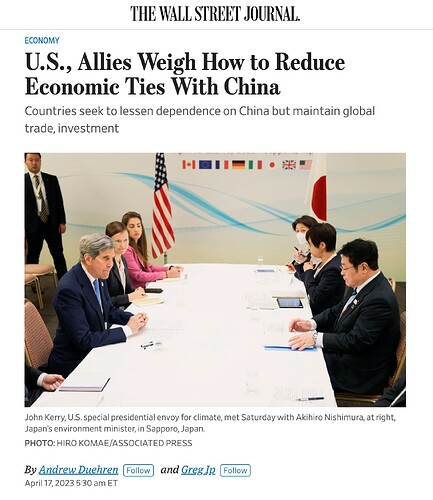-
美国及其盟国正试图在他们认为具有战略意义的某些领域限制与中国的经济关系,同时保留更广泛的贸易和投资流动。这种政策的转变是由于从俄罗斯入侵乌克兰中吸取了教训,该事件破坏了全球能源市场的稳定。七国集团正试图在具体的政策措施背后达成统一,以减少对中国的依赖,同时避免采取可能导致全球经济衰退的步骤。
-
美国已经颁布了新的法律,提供重大补贴以吸引关键技术公司进入该国,并限制向中国出口先进半导体和相关设备。财政部长珍妮特-耶伦(Janet Yellen)呼吁美国 “以邻为壑”,在贸易上更紧密地依靠其盟友,但国际货币基金组织(IMF)已警告这种做法会带来负面后果。
-
尽管有这些警告,美国与中国的贸易在2020年达到了创纪录的水平。耶伦认为,开放贸易的好处可以通过 "朋友圈 "来维持,而认为这将导致巨大的分裂和贸易利益的丧失的说法是无效的。一些盟友对拜登政府减少与中国关系的做法表示担忧。
-
美国一直在为清洁能源技术提供补贴,以在中国以外的地区建立该行业,这激怒了欧洲官员。
-
美国官员正试图通过与欧盟就贸易协议和清洁能源激励措施的论坛进行合作来缓解抱怨,以防止补贴战争的发生。
-
在美国推动从中国独立的过程中,在台湾问题上发生军事冲突的可能性正在隐现。
-
美国官员正试图限制美国对中国的投资,将目标放在能够帮助增强北京军事能力的部门。
-
这些规定将禁止美国对量子计算和先进半导体的私人股权和风险资本投资,同时要求公司披露对不太先进的半导体的此类投资。
-
美国官员也在为如何解决人工智能问题而苦恼。
-
美国正试图召集七国集团的其他成员支持限制对中国投资的提议。
-
中国已经对澳大利亚和立陶宛实施了非正式贸易禁运。
-
中国还在考虑限制关键太阳能制造技术的出口。
-
欧盟已经就 "经济胁迫文书 "草案达成一致,该议题预计将被列入下个月在日本举行的七国集团领导人峰会的议程。
-
The U.S. and its allies are attempting to limit economic relationships with China in certain sectors they view as strategic while preserving broader trade and investment flows. This shift in policy is due to the lessons learned from Russia’s invasion of Ukraine, which destabilized global energy markets. The G-7 is attempting to unify behind specific policy measures that reduce dependence on China while avoiding steps that could lead to global economic decline.
-
The U.S. has enacted new laws that offer major subsidies to lure key technology companies into the country and has restricted the export of advanced semiconductors and related equipment into China. Treasury Secretary Janet Yellen has called for the U.S. to “friendshore” and rely more closely on its allies for trade, but the IMF has warned of the negative consequences of this approach.
-
Despite these warnings, U.S. trade with China reached a record level in 2020. Yellen believes that the benefits of open trade can be maintained with friendshoring, and that the argument that it will cause huge fragmentation and loss of the benefits of trade is invalid. Some allies have raised concerns about the Biden administration’s approach to reducing ties with China.
-
The US has been providing subsidies for clean-energy technology to build up the industry outside of China which has angered European officials.
-
US officials are attempting to ease the complaints by working on trade deals and a forum on clean-energy incentives with the EU to prevent a subsidies war.
-
The possibility of a military conflict over Taiwan is looming over the US push for independence from China.
-
US officials are trying to restrict US investment into China by targeting sectors that can help enhance Beijing’s military capabilities.
-
These rules are set to prohibit US private-equity and venture-capital investment in quantum computing and advanced semiconductors, while requiring firms to disclose such investments in less-advanced semiconductors.
-
US officials are also struggling with how to address artificial intelligence.
-
The US is trying to rally the rest of the G-7 behind the proposal to restrict investment into China.
-
China has imposed informal trade embargoes on Australia and Lithuania.
-
China is also considering restricting exports of key solar manufacturing technology.
-
The EU has agreed on a draft “economic coercion instrument” and the topic is expected to be on the agenda for the G-7 leaders’ summit in Japan next month.
